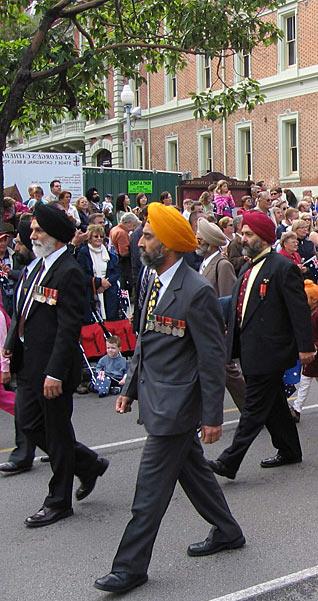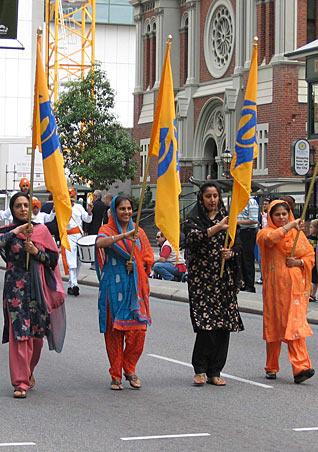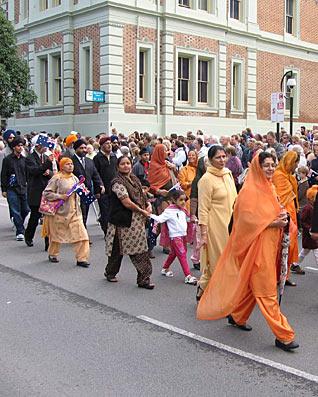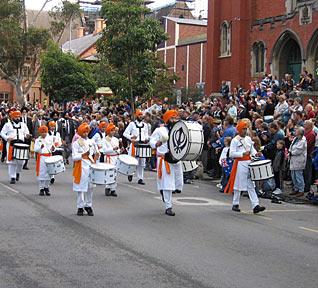Columnists
Aussie Anzac Day
Honours Sikh Heroes
by Manpreet Kaur Singh
Sikhs always had a disproportionately huge role to play in the Indian army, the British Indian army and in the Allied Forces during both the World Wars. But who would have thought that there were Sikhs in the Australian army way back in the early 1900's and that some of them actually fought in the First World War as Australian soldiers!
According to the National War Memorial in Australia's capital, Canberra, seven Sikhs were part of the Australian armed forces during the First World War Their names and the battalions they were part of, are as follows:
Davy Singh 33rd Battalion
Desanda Singh 3rd Light HorseGanessa Singh 10th Battalion
Gurbachan Singh 54th Battalion
Hazara Singh 13th Battalion
Sarn Singh 43rd Battalion
Sirdar Singh 3rd Light Horse
Six of these soldiers returned safely after the War ended in 1918, but one of them (Sarn Singh) died in action.
But this is just the proverbial tip of the iceberg. According to one estimate,
"In the last two world wars, 83,005 turban-wearing Sikh soldiers were killed and 109,045 were wounded for the freedom of Britain and the world during shell fire, with no other protection but the turban, the symbol of their faith."
[General Sir Frank Messervy, KCSI, KBE, CB, DSO: "The Sikh Regiment in the Second World War"]
According to another source,
"In 1914, there were 35,000 Sikhs fighting in the War. By the end of the War, 100,000 volunteers had joined the various sections of the British Armed Forces. It is 'estimated that the contribution of the Sikh Community in men and material was ten times that of any community of India. Of the 22 Military Crosses awarded for conspicuous gallantry to Indians, the Sikhs won 14.' "
[Amandeep Singh Madra and Parmjit Singh: "Warrior Saints - Three Centuries of the Sikh Military Tradition."]
So, it is really heartening to see Sikhs in Australia waking up to these facts and partaking in special services that honour war veterans.
One such occasion is Anzac Day, celebrated throughout the country on April 25, marking the landing of Australia and New Zealand Armed Corps (ANZAC) at Gallipoli (Turkey) in 1915. Every year, there are ceremonial marches and parades in most Australian cities to mark the sacrifice of those who lost their lives in the line of duty.
The Sikh community of Western Australia has proudly joined in this tradition of paying homage to their forefathers too, because they fought alongside the Australians during both the World Wars.
Since 2005, there has been a Sikh contingent in the Anzac Day march in Perth, comprised of direct descendants of those who fell in Gallipoli and other campaigns.
Says Kuljit Kaur Jassal, an ex-Royal Australian Air Force officer, who is one of the organisers of the Sikh complement: " We also want the Australian public to know that our grandfathers fought alongside their grandfathers in Gallipoli. Not just that, more than 80,000 Sikhs died in the two World Wars as part of the Allied forces. These brave young men fought for our freedom, and we must honour their memory."
In previous years, a Malaysian Pipe and Drum troupe called the "Dasmesh Band" led the Sikh contingent in the march. This year, however, for the first time, there was a Western Australian Sikh Band leading them.
The Drum Band was comprised of ten members, seven of them aged between 10 and 15 years. The Drum Major in the WA Sikh Band was Dr Tejinderpal Singh whose great- grandfather, Nanak Singh, fought in Gallipoli. Nanak Singh's son Shiv Singh also fought in World War II.
Dr. Singh wore his great-grandfather's medals when he marched on Anzac Day 2007, as did many others in the contingent.
Other band members included young Amarvir Singh (whose great-grandfather fought in Mesopotamia, and grandfather was in the Indian army), and the only female member of the band, Husveena Kaur, (whose maternal grandfather was in the Malaysian Army Reserves and paternal great-grandfather fought in Mesopotamia).
The band members practiced diligently with trainers and stole the show at the Perth march, looking resplendent in their white kurtas and saffron dastaars, complete with kalgis.
In another first, there was a Sikh contingent in the Sydney Anzac Day parade this year as well. Apart from that, there were special commemorations at some RSL (Returned Services League) Clubs in suburban Sydney too.
19-year-old Jasmeen Kaur Malhotra gave a speech on behalf of the Sikh community in Revesby and outlined the proud history of Sikhs in the World Wars. The most heartening thing about both the Perth and the Sydney services was the inclusion of youth and children - the youngsters led from the front, which is a promising thing for any community.
Let's hope that that others around the world continue to find the time to participate in memorials and marches like these. It has been eloquently said that those who forget their history are condemned to repeat it. So let's all make an extra effort in each of our respective communities to honour the memory of those on whose proverbial shoulders we stand today.
Conversation about this article
1: Kulbir Singh (Sydney, Australia), May 01, 2007, 9:22 PM.
Very informative and beautifully written article. Great to see that (i) youth are actively participating; and (ii) women are carrying the Nishan Sahib.
2: Jassy (Australia), May 06, 2007, 5:45 AM.
Well done, well written and good coverage.
3: Sarabjeet Singh (Adelaide, Australia), May 06, 2007, 8:11 PM.
I would like to praise the efforts of all the people who made this event a memorable one. What a beautiful and innovative way to augment the awareness of Sikhi among Australians. Kudos to the spirit of everyone, ranging from the organisers to band players and to the author of this article as well.
4: Amardeep Singh Virk (Faridkot, India), October 28, 2008, 2:09 AM.
My father's Taya ji (uncle), Sepoy Nidhan Singh Virk of the 14 Sikhs /4379 fought and died during WWI in Gallipoli. He was Awarded two medals, one reading "He died for Freedom and Honour", and the second is the Gallipoli Star. I'm continuously searching for his record. He belongs to the 14 Sikhs /4379. Kindly help.
5: Amrinder Sidhu (Melbourne, Australia), November 04, 2008, 10:09 AM.
Good work ... really appreciated! Nice article. It will surely make Australians think and learn to appreciate the extraordinary contribution of the Sikhs to the world. Thanks.
6: Harjinder Singh (Sydney, Australia), April 02, 2009, 7:12 AM.
Very nice article. This is not only information for the world, but also for us Sikhs to feel proud that we are the inheritors of such a huge, respectful and powerful history. I am a Sikh and I'm proud of that. We not only showed our strength, discipline and self respect to the Moghuls and the English but also to the whole world.
7: Rakesh (India), June 02, 2009, 6:26 AM.
Nice write up. I am not Sikh. God bless the Sikhs, the Indians and everyone else!
8: Dr Bhupinder Singh (Adelaide, Australia), September 09, 2012, 5:33 AM.
Very proud to be a Sikh.
9: Jaswant Singh Dhillon (Brierley Hill, England), November 06, 2013, 12:26 PM.
My Nana ji, S. Isher Singh was that Sikh from Penang who was a pensioner from the Indian Army. His son S. Sohan Singh was Superintendent in Rawang, Malaysia. I served in the RAF 1962-1984 and am now retired from British Police.
10: Shadaan (Canada), November 27, 2013, 2:36 PM.
I salute these proud Sikhs. This kind of information is very good. It lets the world know the contribution of the Sikhs to the free world, lest they forget.
11: Gagan Singh (Melbourne, Australia), April 07, 2014, 5:17 AM.
Came through this post while searching for information regarding Sikh-Australian soldiers. Proud to be Sikh.
12: A. Wilson (Brisbane, Australia), April 23, 2015, 8:36 AM.
Just saw a story on ABC 24 TV late news about the setting up of the WA Sikh Marching Band and Sikh contribution to Gallipoli. Delighted to hear about this, and congratulate the Sikh community and the gentleman who founded the marching band. Fantastic people, well done.
13: Nehchal Singh (Melbourne, Australia), June 06, 2015, 2:06 PM.
I just came to know on Anzac Day that my great grandfather S. Desanda Singh fought for the Australian army in the battle of Gallipoli. It was a moment of immense pride. I just wish to connect with some of the Sikh community members who actively participate in the parade every year and are descendants of Sikh soldiers who fought in WWI for Australia. Can any one please assist?
14: David Jones (Bedford Park, Australia), April 21, 2016, 4:58 AM.
My grandfather did not forget the Sikhs and other Indians he fought with at both Gallipoli and the Western Front. Bahaadar!






